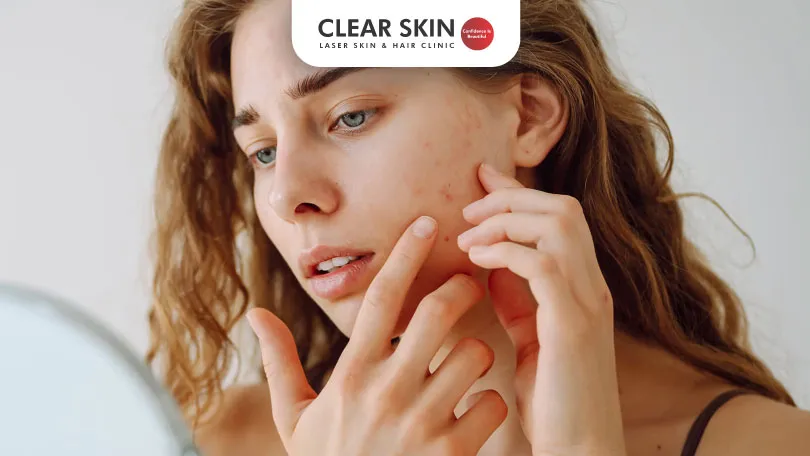Does Makeup Cause Acne-Prone Skin?

Written by Clear Skin Content Team | Medically Reviewed by Dr. Dhanraj Chavan on June 28, 2025

For many people, makeup is an essential part of their daily routine. It boosts confidence, enhances facial features, and allows creativity. However, for those with acne-prone or sensitive skin, applying makeup often leads to a troubling question: does makeup cause acne? The connection between makeup and acne breakouts is a concern, especially in humid climates. This Article explores how makeup impacts acne-prone skin and provides clear, dermatologist-informed advice from Skin Specialist Clinic Pune to help you maintain a healthy complexion.
Table Of Content
- Can Makeup Cause Acne?
- Decoding Terms Like “Non-Comedogenic” and “Oil-Free”
- Tips for Using Makeup Safely on Acne-Prone Skin
- Mistakes That Worsen Acne
- Makeup for Oily and Sensitive Skin
- When to Consult a Dermatologist
- Conclusion
Can Makeup Cause Acne?
The answer isn’t straightforward. Makeup itself doesn’t directly cause acne, but certain ingredients, types of products, and application habits can clog pores, irritate skin, and trigger breakouts. This is especially true for acne-prone skin since it’s already sensitive to oil build-up and inflammation. The type of products you use and how well you care for your skin after makeup application are key to maintaining a clear complexion.
How Makeup Triggers Acne?
- Clogged Pores
Ingredients like mineral oil, lanolin, or certain silicones can trap dirt and oil, worsening acne. This is particularly problematic in poorly ventilated regions with high humidity. - Irritating Chemicals
Fragrances, artificial dyes, and alcohol-based formulations are harsh on sensitive skin and can lead to irritation or inflammation. - Heavy or Occlusive Products
Thick, oil-based products often feel too heavy for acne-prone or oily skin, blocking pores and trapping bacteria. - Improper Removal
Sleeping with makeup on suffocates your skin, preventing its natural repair process and leading to more breakouts.
Decoding Terms Like “Non-Comedogenic” and “Oil-Free”
Non-Comedogenic
This means the product is specifically formulated to not clog pores. It’s ideal for acne-prone or oily skin as it reduces the chances of breakouts.
Oil-Free
Products labelled as oil-free avoid adding excess oil to your skin. This is a must for individuals whose skin produces sufficient oil naturally.
Fragrance-Free
Fragrances can irritate sensitive skin and cause allergic reactions. Fragrance-free makeup and skincare products are much gentler.
Hypoallergenic
These products are less likely to cause allergic reactions, making them a good option for people with sensitive skin.
Tips for Using Makeup Safely on Acne-Prone Skin
There’s no need to avoid makeup completely if you have acne-prone skin. Instead, adapt your routine with these dermatologist-approved tips:
- Choose the Right Formulas
- Opt for non-comedogenic, oil-free, and fragrance-free products.
- Use lightweight, water-based foundations or BB creams.
- Powder-based makeup can help absorb excess oil without clogging pores.
- Prep Your Skin Properly
Always start with a clean face. Use a gentle, gel-based cleanser, followed by a light, non-comedogenic moisturiser and sunscreen. This prepares your skin for makeup while creating a barrier against pore-clogging products. - Don’t Forget a Primer
Primers smooth the skin’s surface and act as a protective layer. Choose a silicone-based primer designed for oily or acne-prone skin. - Apply Makeup with Clean Tools
Dirty brushes and sponges harbour bacteria. Wash your tools regularly with mild soap or a brush-cleanser. - Avoid Heavy Layers
Less is more. Avoid layering too much foundation or concealer, as it can lead to clogged pores. - Set Your Makeup
Use a matte-setting powder or spray to reduce oiliness and make your makeup last longer in humid conditions.
Mistakes That Worsen Acne
Even the best product choices can’t save your skin if you make certain common makeup mistakes:
- Not Removing Makeup Before Bed
Sleeping with makeup on prevents your skin from breathing. Use a gentle makeup remover and follow up with a cleanser each night. - Using Expired Products
Old makeup can contain bacteria or lose its non-comedogenic properties. Always check expiry dates. - Overloading with Powder
While powders help reduce shine, overusing them can mix with sweat and oil, blocking your pores. - Ignoring Patch Tests
Always test new products on a small area of your skin before full application to avoid reactions.
Suggested Makeup for Oily and Sensitive Skin
- Foundation
Look for water-based, lightweight options like liquid or mineral foundations. - Concealer
Opt for matte-finish, non-comedogenic stick concealers for spot treatment. - Blush and Highlighter
Powder-based products are better for oil control. - Eye Makeup
Avoid greasy or creamy formulas for eye shadows. Waterproof eyeliners and mascaras work well in humid climates.
When to Consult a Dermatologist ?
If you’re doing everything right but still experience persistent breakouts, it’s time to consult a top dermatologist in Pune. They can help determine if underlying issues like hormonal imbalances or specific sensitivities are causing your acne. Additionally, see an expert if you notice:
- Severe acne that worsens with makeup.
- Itchy or painful reactions to new products.
- Acne scarring or pigmentation that doesn’t fade.
Do You Know?
Roughly 250 Patients Are Treated
Everyday By These Dermatologists
(You are one click away from flawless skin)
Meet Our Dermatologist!
Conclusion
Makeup doesn’t have to be the enemy of acne-prone skin. By choosing the right products, following a proper skincare routine, and avoiding common mistakes, you can enjoy makeup without fear of breakouts. Remember, healthy skin requires care and consistency. Consult a dermatologist if needed and prioritise high-quality, skin-friendly products.
For those living in humid areas like Mumbai or Chennai, these adjustments are even more critical. If you’re in Pune, Clear Skin Clinic can help you with expert guidance tailored to your skin’s needs. Love your skin, care for it, and you’ll find that a balanced approach lets you have the best of makeup and clear skin.
Note: Information available in this blog is for information purpose only. Make sure you are consulting your dermatoligsts or our experts before getting started.
Further Reading
How to Build an Acne Treatment Routine for Your Skin Type in Pune?
Which acne treatments work best for your skin type in Pune? Compare professional vs at-home options with costs, effectiveness & timelines. Expert guide from Dr. Dhanraj Chavan.
How to Get Rid of a Blind Pimple Safely and Effectively?
Painful blind pimples that don’t heal? Get expert acne treatment at Clear Skin Clinic Pune by a senior dermatologist.
Skincare Routine for Oily and Acne-Prone Skin
Simple, dermatologist-recommended skincare routine to control oil, prevent acne, and maintain healthy skin with long-term results.
How to Build an Acne Treatment Routine for Your Skin Type in Pune?
Clear Skin Clinic Pune reviews: 4.9/5 stars across 13,271+ verified reviews. Real patient experiences, treatment timelines & acne success stories.
Have thoughts? Please let us know
We are committed not only to treating you, but also educating you.





